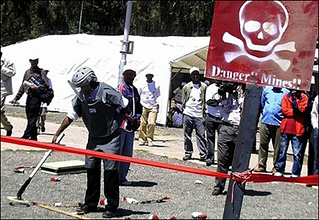 |
 |
 |
 News from Around the Americas | May 2007 News from Around the Americas | May 2007  
Report: 400 Million People Live in "Minefields"
 Robert Evans - Reuters Robert Evans - Reuters


| | A deminer from the Eritrean Demining Authority demonstrates his work to locals at an educational open day in Asmara to raise awareness of the dangers landmines and un-exploded ordinance (UXO) pose. Tens of thousands of explosives litter Eritrea, one of the worst affected places in the world, following years of war. (AFP/Peter Martell) |
Some 400 million people around the world live and work in what are effectively minefields, at daily risk of death or maiming by cluster bombs, according to a report issued this week.

The report, from the campaign group Handicap International, said over 13,000 civilians are known to have been killed or injured in recent years by the bombs, but that the real figure was probably many times higher.

In the wake of armed conflicts "unexploded cluster submunitions turn homes, livelihoods and social areas of 400 million people living in affected countries into de facto minefields," the report said.

Nearly 50 states meet in Lima, Peru, on May 23-25, to discuss a draft of a treaty to ban the weapons, which have been used widely in Iraq, Afghanistan, Lebanon and the Russian region of Chechnya.

In February, 46 countries meeting in Oslo pledged to aim for an international ban by next year that would prohibit the use, production, transfer and stockpiling of the munitions, which can be set off years after they are dropped.

But major cluster bomb-producing states, including the United States, Russia and China, were not in Oslo and have made clear they oppose a blanket ban, arguing that they need to keep the option of using the weapon for defense.

In March Britain became the biggest military power to ban one variety of the weapons, which are designed to kill large numbers of enemy troops by scattering hundreds of tiny bomblets that spread deadly shrapnel over a wide area.

The British government said it would in future use only weapons with self-destruct mechanisms, a decision dubbed insufficient by landmine charities supporting a total ban.

Britain and the United States used thousands of cluster bombs during the invasion of Iraq in 2003 and Israel fired them widely into southern Lebanon last year during fighting with Hezbollah guerrillas.

The Handicap International report said that 98 percent of the casualties of the weapons were civilians "killed and injured while returning home in the aftermath of conflict or while going about their daily tasks to survive." | 
 | |
 |



